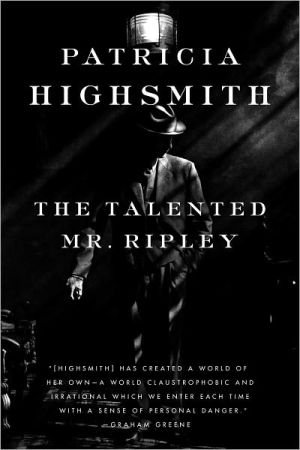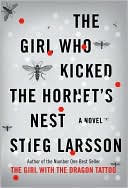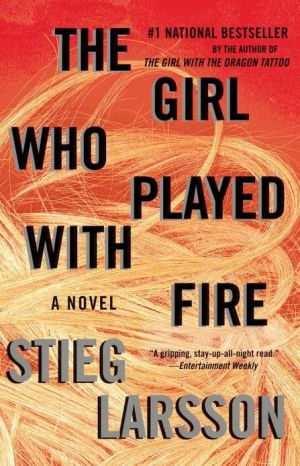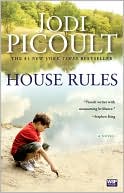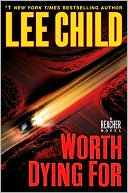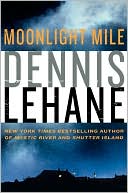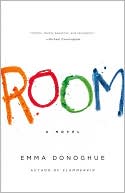The Talented Mr. Ripley
Ripley is back. This new publication of Patricia Highsmith's classic inaugurates the complete Ripley series at Norton.\ Since his debut in 1955, Tom Ripley has evolved into the ultimate bad boy sociopath, influencing countless novelists and filmmakers. In this first novel, we are introduced to suave, handsome Tom Ripley: a young striver, newly arrived in the heady world of Manhattan in the 1950s. A product of a broken home, branded a "sissy" by his dismissive Aunt Dottie, Ripley becomes...
Search in google:
Ripley is back. This new publication of Patricia Highsmith's classic inaugurates the complete Ripley series at Norton.Time MagazineFor eliciting the menace that lurks in familiar surroundings, there's no one like Patricia Highsmith.
\ 'Charley Schriever told me you were in the insurance business,' Mr Greenleaf said pleasantly.\ \ 'That was a little while ago. I--' But he didn't want to say he was working for the Department of Internal Revenue, not now. 'I'm in the accounting department of an advertising agency at the moment.'\ \ 'Oh?'\ \ Neither said anything for a minute. Mr Greenleaf's eyes were fixed on him with a pathetic, hungry expression. What on earth could he say? Tom was sorry he had accepted the drink. 'How old is Dickie now, by the way?' he asked.\ \ 'He's twenty-five.'\ \ So am I, Tom thought, Dickie was probably having the time of his life over there. An income, a house, a boat. Why should he want to come home? Dickie's face was becoming clearer in his memory: he had a big smile, blondish hair with crisp waves in it, a happy-go-lucky face. Dickie was lucky. What was he himself doing at twenty-five? Living from week to week. No bank account. Dodging cops now for the first time in his life. He had a talent for mathematics. Why in hell didn't they pay him for it, somewhere? Tom realized that all his muscles had tensed, that the matchcover in his fingers was mashed sideways, nearly flat. He was bored, God-damned bloody bored, bored, bored! He wanted to be back at the bar, by himself.\ \ Tom took a gulp of his drink. 'I'd be very glad to write to Dickie, if you give me his address,' he said quickiy. 'I suppose he'll remember me. We were at a weekend party once out on Long Island, I remember. Dickie and I went out and gathered mussels, and everyone had them for breakfast.' Tom smiled. 'A couple of us got sick, and it wasn't a very good party. But I remember Dickie talkingthat week-end about going to Europe. He must have left just--'\ \ 'I remember!' Mr Greenleaf said. 'That was the last weekend Richard was here. I think he told me about the mussels.' He laughed rather loudly.\ \ 'I came up to your apartment a few times, too,' Tom went on, getting into the spirit of it. 'Dickie showed me some ship models that were sitting on a table in his room.'\ \ 'Those are only childhood efforts!' Mr Greenleaf was beaming. 'Did he ever show you his frame models? Or his drawings?'\ Dickie hadn't, but Tom said brightly, 'Yes! Of course he did. Pen-and-ink drawings. Fascinating, some of them.' Tom he'd never seen them, but he could see them now, precise draughtsman's drawings with every line and bolt and screw labelled, could see Dickie smiling, holding them up for him to look at, and he could have gone on for several minutes describing details for Mr Greenleaf's delight, but he checked himself.\ \ 'Yes, Richard's got talent along those lines,' Mr Greenleaf said with a satisfied air.\ \ 'I think he has,' Tom agreed. His boredom had slipped into another gear. Tom knew the sensations. He had them some-times at parties, but generally when he was having dinner with someone with whom he hadn't wanted to have dinner in the first place, and the evening got longer and longer. Now he could be maniacally polite for perhaps another whole hour, if he had to be, before something in him exploded and sent him running out of the door. 'I'm sorry I'm not quite free now or I'd be very glad to go over and see if I could persuade Richard myself. Maybe I could have some influence on him,' he said, just because Mr Greenleaf wanted him to say that.\ \ 'If you seriously think so -- that is, I don't know if you're planning a trip to Europe or not.\ \ 'No, I'm not.'\ \ 'Richard was always so influenced by his friends. If you or somebody like you who knew him could get a leave of absence, I'd even send them over to talk to him. I think it'd be worth more than my going over, anyway. I don't suppose you could possibly get a leave of absence from your present job, could you?'\ \ Tom's heart took a sudden leap. He put on an expression of reflection. It was a possibility. Something in him had smelt it out and leapt at it even before his brain. Present job: nil. He might have to leave town soon, anyway. He wanted to leave New York. 'I might,' he said carefully, with the same pondering expression, as if he were even now going over the thousands of little ties that could prevent him.\ \ 'If you did go, I'd be glad to take care of your expenses, that goes without saying. Do you really think you might be able to arrange it? Say, this fall?'\ \ It was already the middle of September. Tom stared at the gold signet ring with the nearly worn-away crest on Mr Greenleaf's little finger. 'I think I might. I'd be glad to see Richard again--especially if you think I might be of some help.'\ \ 'I do! I think he'd listen to you. Then the mere fact that you don't know him very well-- If you put it to him strongly why you think he ought to come home, he'd know you hadn't any axe to grind.' Mr Greenleaf leaned back in his chair, looking at Tom with approval. 'Funny thing is, Jim Burke and his wife--Jim's my partner--they went by Mon-gibello last year when they were on a cruise. Richard promised he'd come home when the winter began. Last winter. Jim's given him up. What boy of twenty-five listens to an old man sixty or more? You'll probably succeed where the rest of us have failed!'\ \ 'I hope so,' Tom said modestly.\ \ 'How about another drink? How about a nice brandy?'
\ From Barnes & NobleTalented, Sick, and Wonderful \ The late Patricia Highsmith was one of the great crime novelists of the 20th century. In her case, though, the term "crime novelist" seems unfairly limiting. She was first and foremost a novelist, and utilized stories of crime and violence to support her complex examinations of character and her acute observations of the debilitating effects of guilt, boredom, and domestic unhappiness on otherwise unremarkable lives. Born in Texas in 1921, Highsmith spent most of her life as a European expatriate, an experience that informed her fiction in a number of ways. During the course of her career, which spanned nearly 50 years, she produced 7 collections of short stories and more than 20 novels, some of which, ironically, are now better known for the film adaptations they inspired.\ Her first novel, Strangers on a Train, was brilliantly filmed by Alfred Hitchcock in 1951. Her third and -- by many accounts -- best book, The Talented Mr. Ripley, has now been filmed twice. The first version, "Purple Noon," appeared in 1966. It was directed by René Clement and starred Alain Delon as the enterprising Tom Ripley. The latest version, just released in time for Oscar consideration, stars Matt Damon and Gwyneth Paltrow and has been directed by Oscar winner Anthony Mingella (The English Patient). It is one of the more anticipated movies of the season and provides a convenient pretext for a look back at the original novel and its underappreciated creator.\ The Talented Mr. Ripley, which won an Edgar award as Best Novel of 1956, was the first of five books to feature the eponymous con man, Tom Ripley. As the story begins, Tom is a 23-year-old loser living a hand-to-mouth existence in New York City. A liar and inveterate role-player with vague aspirations to a better life, he drifts aimlessly from job to job and from scheme to scheme, surviving largely through the sufferance of his friends. With his latest scheme -- impersonating an agent of the Internal Revenue Service -- he has crossed the line into outright fraud and is living in expectation of imminent arrest. Just then, in keeping with his belief that "something will always turn up," an unexpected opportunity comes his way.\ A wealthy shipbuilder named Herbert Greenleaf -- father of Richard "Dickie" Greenleaf, an old, casual acquaintance of Ripley's -- hires Tom to travel to Italy, track down Dickie (who is now living a bohemian life as a painter and sailor), and talk him into returning home. Tom gratefully accepts this commission, sets sail for Europe, and locates Dickie in the small Italian village of Mongibello. Dickie, who bears a surface resemblance to Tom, is living an enviable life. He owns a house, a boat, and a trust fund. Except for a platonic relationship with fellow expatriate Marge Sherwood, he is unattached and free to pursue his interest in painting, a calling for which he has more passion than talent. Tom quickly insinuates himself into Dickie's life. Eventually, driven by a compulsion he cannot resist, he claims that life for his own. On a boating trip near the village of San Remo, Tom murders Dickie, buries the body at sea, and proceeds to present himself to the world as Dickie Greenleaf.\ The bulk of The Talented Mr. Ripley concerns Tom's attempts to sustain this complex impersonation, which requires him to shuttle back and forth between identities; to avoid all contact with Dickie's former friends; to maintain a believable, ongoing correspondence with the Greenleaf family; to commit forgery, larceny, even murder, in order to protect his secret. Highsmith recounts this tortuous process in a direct, unadorned style that generates considerable tension. The conclusion, which goes completely against the grain of more conventional suspense novels, brilliantly reflects the author's belief that we live in a universe in which irony rules and justice is rarely meted out.\ While The Talented Mr. Ripley is an ingeniously plotted novel, its heart -- its psychological center -- lies in its carefully composed presentation of Tom Ripley. For years, critics have described Ripley as callous, calculating and, above all, "amoral," and he is surely all of those things. Mostly, though, he is a kind of visible emptiness, a void waiting to be filled with a viable -- if stolen -- identity. At one point, Marge Sherwood refers to Tom as a "nothing," and she is absolutely correct. Tom's decision to impersonate Dickie -- to become, in effect, someone else -- is a logical reflection of his essentially unformed character, which exists within a moral and spiritual vacuum. As Dickie Greenleaf -- a role he internalizes with astonishing thoroughness -- Tom acquires a sense of personal substance he has never before achieved. As Dickie, he now has a face to present to the world, and his successfully sustained performance ironically strengthens his alternate identity as Tom Ripley, a young man who finds his true self through covetousness, murder, and the systematic application of his peculiar, schizophrenic gifts.\ Tom Ripley, a man immersed in a variety of roles, is among other things a great role for the right actor. It will be interesting to see just how much of his chameleon-like character Matt Damon is able to capture in the forthcoming film. Still, whatever the movie's ultimate fate might be, its appearance should focus renewed attention on Highsmith and her work, and that is entirely a good thing. If just a small fraction of the people who see the movie purchase the book, the Highsmith revival, which is long overdue, might finally come to pass. It never hurts to hope.\ —Bill Sheehan\ \ \ \ \ \ New York Times Book ReviewThe Talented Mr. Ripley not only demonstrates Highsmith's gift for using the genre conventions of the mystery novel to explore the existential ambiguities of identity, but it also attests to her keen gift for psychological insight. By chronicling the ordinary details of Ripley's life and the logical workings of his mind, she forces us to re-evaluate the lines between reason and madness, normal and abnormal, while goading us into sharing her treacherous hero's point of view.\ \ \ New YorkerPatricia Highsmith's novels are peerlessly disturbing...bad dreams that keep us thrashing for the rest of the night.\ \ \ \ \ Time MagazineFor eliciting the menace that lurks in familiar surroundings, there's no one like Patricia Highsmith.\ \
